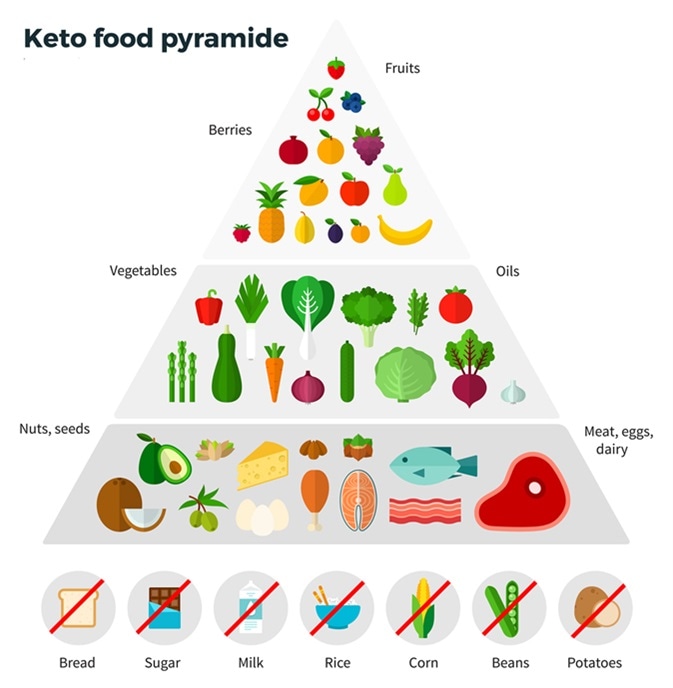Each of us has a time machine: that which transfers into the past – memories; what takes you to the future is dreams.
H.G. Wells
Hello! To understand how long to sit on Keto, you need to know everything about this beast.
How much to sit on Keto? Research by scientists.
Let’s start with the question – “What does modern science say about the timing of adherence to the keto diet?” I read various options and rummaged through a lot of different information on this topic. More precisely, now it just came in handy for this, but I needed the info when I was looking for answers. At the time of my search, I had been in hard Keto for eight months. I got rid of my health problems and lost 30+ kg of excess weight. Everything suited me, or instead almost everything.
So, “Should I finish keto or stay in it?” I started looking for answers in the research and opinions of doctors.
Yes, in fact, for me, the question was exactly that. Why change this type of food if it suits me? But the cats were scraping. And research suggests the following effects of long-term adherence to the keto diet:
- The energy and strength surge disappears after 8-12 months of the keto regimen.
- Long-term adherence to the keto regimen can deplete the body because of the lack of some micronutrients (vitamins, minerals, etc.). It is especially important with an unbalanced diet. Oddly enough, it can also be experienced by ketosis. They stop paying attention to food variety.
- In the long term (more than 1 year continuously), Keto can negatively affect the gut microbiota. (this is controversial since there is also reverse research, but it is worth bearing in mind).
- The keto diet fizzles out in terms of weight loss after 8-12 months of adherence.
- The keto diet ceases to be a curative diet option if the indications for adherence have exhausted themselves.
- Long-term adherence to one type of diet reduces metabolic plasticity. (I’ll talk about that later)
For myself, I already knew for sure that Keto is an excellent way of a therapeutic nutritional protocol and comfortable weight loss. But there was no longer any reason to be treated, and there was nowhere to lose weight. These arguments prompted me to look for other nutritional options to remain useful and fit into the current guidelines, but without the potential disadvantages of a long-term keto regimen. More on this later.
Now, a couple of takeaways from my research on the minimum amount of time to stick to a keto diet:
- Compliance with a ketogenic diet for less than the adaptation period is meaningless. It merely increases stress for the body but does not yet have time to trigger positive aspects of ketogenesis.
- An attempt to comply with interval keto (no more than 1 week, with interruptions) without full adaptation leads to metabolic disorders and rapid weight gain.
- Trying a keto diet for 1-2-3 days makes no sense, since during this time, the glycogen reserves (the body’s carbohydrate reserve) will not have time to deplete, and you will gorge on fat and without benefit. It will result in a hunger strike for fatty foods and extra stress for the body.
The conclusion (from myself) from this: Keto for a period of less than the adaptation period is merely meaningless. And I think the most correct is the minimum time of adherence to the keto regimen, either before reaching your goals or getting rid of food addictions.
In my case, the timing of the keto diet is:
- 3-4 months before getting rid of food addictions.
- 8-9 months to achieve the set goals.
Next, let’s talk about personal experience, it, of course, is not a scientifically grounded representative sample, but for that, this is my personal experience.
My experience of being in ketosis.
Before starting the keto diet, I set a goal for the minimum amount of time I was in ketosis. For me, it was 1-2 months. I spent a month on adaptation and a month on – to decide what to do next. Live like this and see what happens. For me, it was an experiment on myself, without supervision and support. This has not happened in our country. Why am I doing this?
Besides, I have no personal experience of following a keto diet for one week without prior adaptation.
Later, I had the experience of entering Keto for a short time, but after adapting and restructuring the body. And I want to please you. When I lived on hard Keto for a long time, my body was used to eating fat. I got used to it so much that after the end of Keto, it is already relatively easy to enter ketosis. Without tangible consequences and disadvantages of adaptation. Of all the possible minuses, I still have one – this is two days, the digestion is rebuilt and even then not often. Everything. And as if the switch switches. The body does not care if there are fats (ketones) or carbohydrates (glucose).
But if you don’t teach the body to eat decomposed fats and try to enter ketosis for a couple of days, it will worsen. According to the reviews of people trying this method, it is at least uncomfortable. There are other unpleasant consequences – digestive problems, acute situations with the bile and liver, weight gain, and others.
Including because of such experimenters, negative reviews about the keto diet appear. I read these and am amazed. Example:
“The keto diet didn’t suit me at all! I gained weight and had a constant stomach ache for the whole month of the keto diet! The test strips never showed ketones. I couldn’t eat this fat for more than 2-3 days in a row! Don’t try – it’s all nonsense, it doesn’t help at all. “
Conclusion – don’t start a keto diet if you don’t know what to eat, how much to eat, how to eat, and how long you will eat it! Lack of nutrition is worse than a regular carbohydrate diet. To understand what Keto is, read my website, read examples and recipes. Choose your keto menu – this will solve most of the questions about the keto diet.
Now let’s talk about how long to stay on the keto diet.

Again, this part of the article is about my subjective experience. Of course, this is not a representative sample of a scientific publication, but this is what I have. And experience says the following:
- The keto diet is running out of steam. Exhaled in the part of the energy flow. Perhaps the organism (the brain?) It is just getting used to it, and it is not felt so sharply, but subjectively this is precisely the case.
- With a long-term keto regimen, plateaus in weight loss appear more and more often. However, this can be with any diet. In fairness, I will say that these plateaus are successfully overcome without leaving ketosis.
- Observing the keto regime, for me, from late summer to early autumn is quite tricky morally. Simply because there is a seasonal abundance of fresh vegetables, berries, and fruits. At the same time, I see no objective reason to refuse them.
By the way, it was the last point that prompted me to the principle of cycling food, which I adhere to this hour. Let’s say this seems to be the most natural and correct for a person in focus.
For the harvest season, in my lane of residence, I am coming out of ketosis. I stay on lchf nutrition principles. I also eat whole foods but do not limit my starchy vegetables, fruits, and berries. Of course, I don’t add flour. Sometimes I eat good cereals and legumes in small quantities.
I tend to stick to a ketogenic diet for the winter, especially late winter and early spring. This seems natural to me simply because our ancestors during this period often could not afford a carbohydrate diet and ate protein-fat food seasonally. During the rest of the year, food remains mixed. If you need to mobilize the body, solve many current problems – then the keto diet. If you have time to relax, but so as not to harm yourself – LCHF.
Another argument that appeals to me in favor of such a cyclical keto/lchf:
I have great doubts that with a long-term keto diet, it is quite possible to find other negative consequences, as previously seen, with long-term adherence to the diet’s carbohydrate type.
There is certainly logic in this. I ate carbohydrates all my life until I faced the consequences of too many carbohydrates. So now is it worth trying to eat only fats for the next 30-40 years to try to find other unknown effects?
No, too many carbohydrates were enough for me. Now, I’m in favor of metabolic plasticity. There is such a right term. This is when the body can quickly adapt itself to current needs. They can eat fat when there are no carbohydrates but can eat carbohydrates without raising blood sugar to critical levels. It seems to me that this balance, this plasticity should be inherent in all of us. When we can change the principles of nutrition, do not radically use only one of them, but combine them when we feel good and comfortable! This is health. This is the most real healthy food.
My conclusions about the timing of ketosis for a healthy person.

Let me summarize the article. The keto diet is training the body to feed on fats and develop metabolic plasticity. This is an excellent way to support the treatment of many ailments caused by humanity’s carbohydrate diet, including excess weight. This is a way to get rid of the damage to the body caused by life on carbohydrates. For myself, I realized that it is worth adhering to it for at least 2-3 months, but continuously for no more than one year, if there is no clinical indication for that. Clinical indications for permanent ketosis are a separate big topic, and I will discuss it separately later. But I also realized that I could return to Keto when I need to and get out of it whenever I want. The freedom of metabolic plasticity and the ability to use the ketogenic regimen to your advantage is cool!
Do not become fanatics of one thing. Fanaticism is wrong. Do not think that there is only one correct way to live, eat, and the rest are false. We are all different, and it is worth learning to understand your body precisely. How much you need to follow a keto diet, you can tell only yourself, having gathered the knowledge and experience of those who came before you and understood your body.



